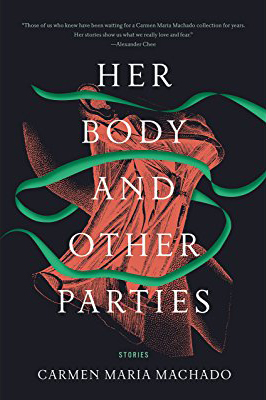Part of what excites me about reading a debut author’s book is the originality of voice I might discover. The short fiction in “Her Body and Other Parties” by Carmen Maria Machado is so wild and inventive with an impressive variation in structure and subject matter shown from story to story. Often they branch into supernatural or surreal territories where women fade away into the stitching of designer dresses or the spirits of dead prostitutes with bells for eyes haunt a female detective. One story takes place in a post-apocalyptic landscape where the narrator numbers the amount of lovers she’s had, another occurs at a housewarming party that goes awry and one is centred around a clothing shop which seeks to “terrify our patrons into an existential crisis.” But, while this fiction often spills into a wonderful absurdity, I frequently felt an emotional resonance which made it seem very real. Throughout the narrators or characters are disarmingly assertive which gives these tales a confidential and urgent tone: “you may have heard some version of this story before but this is the one you need to know.”
Many of the stories take a different slant on the complications of desire and sex, often describing lesbian affairs or relationships. They also involve complicated ideas about women’s bodies, femininity and the way women present themselves. One that deals with this explicitly is ‘Eight Bites’ where a woman gets “bariatric” surgery in an effort to get thin after all her sisters have already done so. She asks in this “Will I ever be done, transformed into the past tense, or will I always be transforming, better and better until I die?” This is such a fascinating take on the philosophical tension between becoming and being. It’s so exhausting how our lives are frequently concerned with trying to lose weight, get fitter and eat better. Machado has a talent for dredging up all this anxiety which sounds like a low hum throughout our lives. The protagonist of the fable-like ‘The Husband Stitch’ insists that a certain adornment on her body cannot be touched like a private bit of the self that must be preserved and when this is violated she literally comes undone. Another story ‘Real Women Have Bodies’ shows women wilfully melding into designer clothes in a way that seems to provoke questions about the importance we place on fashion and commodities to enhance our sense of self-worth.
I was surprised at how Machado could stir in me feelings of nostalgia with precise descriptions of a thing or sensation I haven’t felt in a long time. For instance, she describes “hard candies twisted in strawberry-patterned cellophane” which I can recall and visualise so precisely as if their colourful wrappers were more exciting than the taste of the candy itself. Or, at one point, a character remembers being a child sitting in front of a humidifier and breathing in the dense mist being pumped out. It’s fascinating how she can use these descriptions to reach back in time to our former selves recognizing in them a more vulnerable or innocent state in our lives. One of the most sombre instances of this is the story ‘The Resident’ where a writer travels to an artists’ residency which happens to be situated on a lake where she spent time as a child camping with a troop of Brownies. Her creative process seems to compel her to physically confront her younger, more awkward self and produces an almost complete breakdown.
As with all the greatest absurd fiction, humour treads closely alongside darker sensations of dread. There are some wickedly funny and original descriptions of people from “a man mean as Mondays” to someone accused of being an “aggressively ordinary woman.” There's also many amusing commentaries on modern life: “Benson is sure that her smartphone is smarter than she is, and finds it deeply upsetting.” Quite often I felt compelled to read on just because I was fascinated to see where she'd take the story next. When it felt like the stories were becoming too ridiculously unhinged I'd come upon a line which felt startlingly heartfelt: “something inside of me is breaking, I am a continent but I will not hold.” Not only does her narrative frequently burst into odd and unfamiliar territory but the form of the story itself is often a revelation. This ranges from instructions that the listener of this tale should cut the reader's hand to the novella ‘Especially Heinous’ which takes the form of episode/season summaries for a supernatural detective television show. Only occasionally did it feel like the stories became so abstract as to be completely alienating like some sections of the stories 'Mothers' and ‘Difficult at Parties’. But, overall, this is a collection filled with such wondrous delights and sharp edges that I revelled in the experience of reading it.









